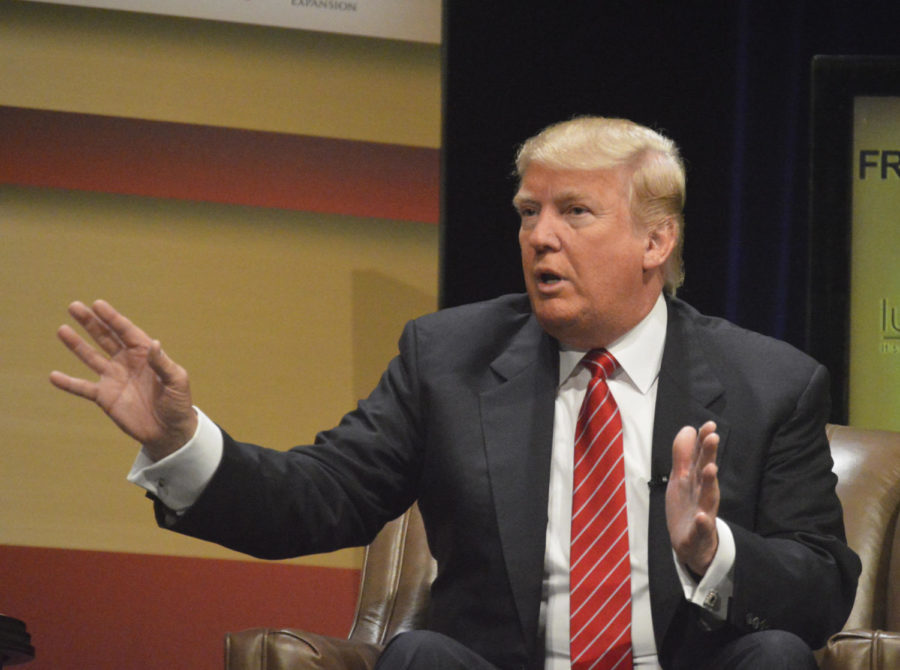Fitten: Identity Theft and Political Parties
Presidential candidate Donald Trump is interviewed at the Family Leadership Summit in Ames on Saturday, July 18.
August 27, 2015
According to the Huffington Post’s Bill Schneider, “Voters don’t support a party simply because they like its policies. They support a party because of who they [the politicians] are.” This is a natural possibility that those watching the 2016 campaign have been concerned about; what with personalities and controversies coming from candidates who have made a real effort to showcase personas ahead of their policies.
This sentiment was well articulated by David Plouffe, the 2008 Obama for America campaign manager, “If you run a campaign trying to appeal to 60-70 percent of the electorate, you’re not going to run a very compelling campaign for the voters you need.”
Therefore, it is not surprising that former Secretary of State Hillary Clinton and Wisconsin Gov. Scott Walker are partisan equivalents who have decided to run campaigns grounded in appealing to their base constituencies instead of appealing to solutions palpable to most Americans.
For Clinton, this has largely been an appeal to Democratic women who want to see a female president. As for Walker, the rhetoric and tone of a fighter who is unscripted and uncensored has been the central theme of his campaign. Instead of chasing the shiny objects, we should concern ourselves with the policy stances of each candidate, especially due to the fact that these stances will impact ISU students.
In 2014, CyRide provided more than 6 million rides. Orange Circulator, Red to Ames Middle School, and Blue to South Duff are incredibly vital to the very fabric of life at Iowa State. It is in your best interest to hear what all 20-some presidential candidates have to say on the issue of public transportation, and not just the candidates who happen to be in the party you customarily support. To date, young people have failed to accomplish this.
Walker has expressed that his vision for public transportation is for every citizen to own a car. I struggle to imagine how our predominantly pedestrian campus would handle a yearly influx of however many cars this change would produce. Additionally, this vision would be misguided not only for our university but any urban or suburban population in the country.
For her part, Clinton has not expressed a specific vision on transportation policy and that must be a function, at least in part, to the fact that she has not found it necessary. No one raised the subject to Clinton when she visited the Alumni Center earlier this summer. In its place, countless selfies with the candidate graced social media accounts belonging to those in attendance.
It will take a good faith effort and an investment of time to ensure that the candidates are acting in our interest on this issue. The research and critical thought to understand and effectively advocate for specific policies is no small task, but a significant responsibility none the less.
A great caveat of this responsibility is that the resources necessary for informed political action are bountiful. Thousands of interests and political advocacy groups work daily on these issues and do their best to spotlight policy differences among the candidates.
So instead of reading daily tip sheets concerned with insider knowledge, the Urban League, the Iowa Ag Summit, Americans for Peace Prosperity and Security and others are doing the consequential work of holding candidates accountable in a mostly transparent way that will also help you discern which candidate actually fits your needs.
We need to reverse the steady erosion of the hypothesis that “at least some [voters] are sensible persons who vote in a manner calculated to nudge public affairs in the direction the judge desirable.” Campaigns centered on identity politics rather than relevant issues won’t get us any steps closer to really effecting change.

















